From panels to pilots: what innovation leaders say on stage (and after)
Reporting from the frontlines of Europe’s top climate innovation events: GITEX Europe, Greentech Festival, and the Climate Transformation Summit.
Right out the gate of Klimatic Group’s launch, co-founders Aneri and Dash were invited to moderate and speak on a slew of panels for three big events across 2 weeks: GITEX Europe, Greentech Festival, and the Climate Transformation Summit.
Industry events can be a blur of booths and buzzwords. We’re here to filter what matters most for the industry, the market, and the people shaping both.
✈️ Dispatch from GITEX EUROPE 2025
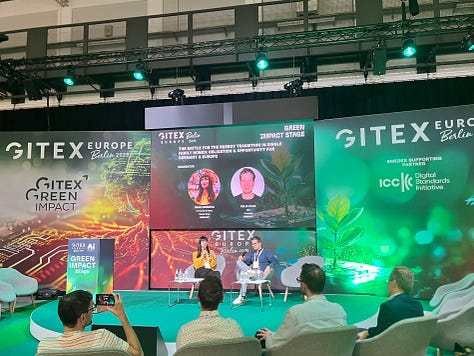

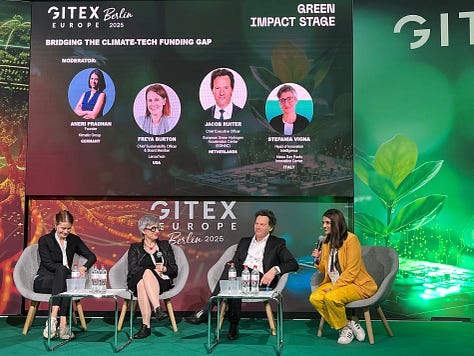
What We Saw 👀
Battery storage went mainstream. Every third booth seemed to demo a containerised BESS, from 1 MWh backyard boxes to 300 MWh grid‑scale rigs. The line between “energy” and “infrastructure” was effectively erased.
Residential heating finally got floor space. Home‑energy retrofits (heat pumps, insulation robots, smart‑meter bundles) enjoyed a prime corridor.
What We Heard 👂
Panel 1 – Delivering Major Energy Storage Capacity
Aneri Pradhan (Klimatic Group) with Siddharth Malik (Energy Transition) & Raphaël Guerithault (SLB)
Demand: 6× jump in EU stationary storage by 2030; 40 GW today → 240 GW.
Bankability: Lenders now treat storage like a gas‑peaking plant with better roundtrip efficiency; revenue‑stack modelling is the new DD sudoku.
Policy wish‑list: standardise grid‑service markets across member states; speed‑lane for transformer permits.
Panel 2 – Bridging the Climate‑Tech Funding Gap
Aneri Pradhan (Klimatic Group) with Freya Burton (LanzaTech), Jacob Ruiter (EGHAC), Stefania Vigna (Intesa Sanpaolo)
Hard truths: First‑of‑a‑kind (FOAK) plants still sit in limbo; equity needs to be stapled to concessional debt, not replaced by it. Climate Tech investments have decreased by 33% in 2024.
Hot take: China remains an attractive scale‑up destination—if IP carve‑outs are watertight and board diversity survives cross‑border dilution.
Panel 3 – Fireside Chat – The Battle for Residential Heating
Dash Markova (Klimatic Group) With Felix Schröder (Thermondo)
Reality check: Only ~5 % of German single‑family homes have heat pumps, despite life‑cycle cost parity with gas.
Core barrier: Up‑front capex ≈ €20k; liquidity, not logic, kills conversion.
Six‑point nudge list: ① Subsidised loans, ② Manufacturing scale‑up, ③ Lower electricity levies, ④ PV + insulation bundles, ⑤ Installer training blitz, ⑥ Policy consistency (stop moving the goalposts!).
What We Said 🎙️
On stage—both panels and the fireside—we flew the Klimatic Group flag for venture clienting: deploying corporate balance sheets as the first customers of climate innovation, not just its investors. Our through‑lines:
Speed beats speculation. Six‑fold storage demand looks scary until you map existing brownfield sites that can host BESS in under 18 months - if offtakers sign early. We urged utilities to pre‑commit.
Finance must marry hardware. We challenged lenders to build project‑finance pods inside growth funds, so FOAK plants stop dying of paperwork.
Home energy is the untapped “infrastructure stimulus.” Heat‑pump roll‑outs create local jobs at 5× the rate of utility‑scale solar. We like the Heat‑as‑a‑Service PPA model - monthly fee, zero up‑front, grid‑balancing kicker - to unlock the stubborn 85 %.
Geopolitics is a feature, not a bug. European supply‑chain anxiety can be leveraged: position EU storage and hydrogen projects as strategic resilience plays, attracting security‑driven capital pools.
🍀 Dispatch from Greentech Festival 2025
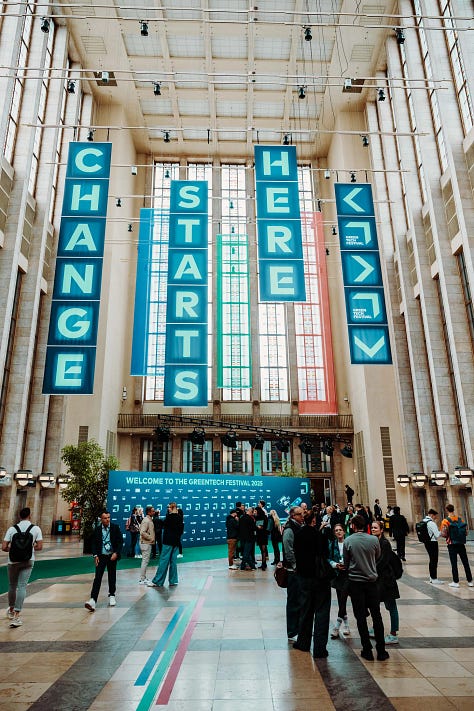
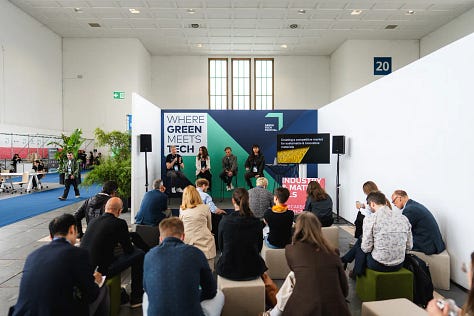

What We Saw 👀
Last week at Greentech Festival, we stepped into a world filled with innovation, ambition, and contradiction. The venue was buzzing with sustainable tech, from climate-positive concrete to electric aviation, but one paradox stood out most to us:
There are tons of innovative green materials but they’re still not used at scale. Furthermore, there were hesitancies from corporates on actually working with startups.
However, we saw real-life proof of how it can work, through two standout startup-corporate collaborations:
LOVR + VW: An alternative leather made from hemp residues, initially not stretchy enough for seats, but ideal for car panels. A case of design pivoting, not product failure.
Syre + H&M: Circular polyester created from textile-to-textile recycling, an answer to one of fashion’s biggest waste streams.
These cases weren’t just showpieces, they were hard-earned collaborations that offered a glimpse into what’s possible when startups and corporates really commit.
What We Heard 👂
Dash Markova (Klimatic Group) moderated a panel on creating a competitive market for sustainable materials. The discussion quickly veered into richer, deeper waters: how venture clienting can unlock startup-corporate collabs in sustainability.
Here’s what we thought was the big problem: price.
Turns out, price isn’t the main issue. The barriers that matter more?
1. Material Fit & Creativity
New materials don’t behave like the old ones. Corporates need to get creative.
LOVR didn’t work for car seats—but was a perfect match for interior panels.
2. Internal Champions
Startups need someone inside the big ship rooting for them. Without a champion, nothing moves.
Montgomery (revoltech) talked to six people at VW before he found Thomas, who finally helped pilot LOVR into the car design process.
3. Long Cycles, Slow Traction
The startup timeline is “months to survive.” The corporate timeline is “years to approve.”
Syre first connected with H&M 1.5 years ago. That pilot is just now launching.
And the audience agreed. In a live poll, slowness was the top frustration across the board, far ahead of cost or certification.
What We Said 🎙️
Sustainable startups and corporates need each other.
But they rarely know how to work with each other.
That’s where venture clienting comes in.
It’s not just about matchmaking. It’s about building bridges, setting expectations, and speeding up that painful early traction.
If we want green materials to become the default - not just the demo - we need more of these:
🌱 Startup-ready corporate teams
🧭 Realistic go-to-market pathways
🛠️ Use-case testing and co-development
💰 Aligned financing that supports long sales cycles
So no, green products don’t scare corporates because of price.
They scare them because they’re different.
And difference takes effort.
But when that effort pays off? We all win.
🌅 Dispatch from Climate Transformation Summit 2025
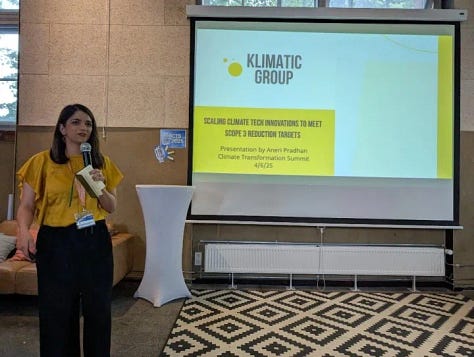
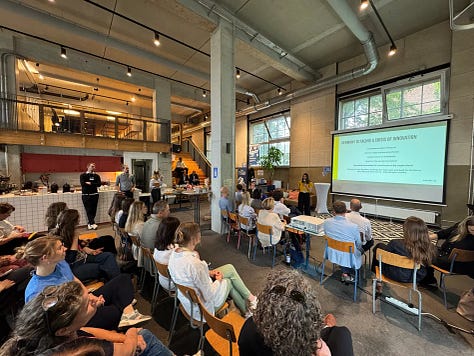

What We Saw 👀
Aneri Pradhan (Klimatic Group) spoke at the Climate Transformation Summit 2025 (CTS2025) in Berlin, a gathering of 100+ sustainability and procurement leaders tackling one of the hardest parts of corporate climate action: Scope 3 emissions.
Hosted by The Climate Choice, the summit focused on the theme “5 Years to Deliver: Making Scope 3 Action Our Business.” What stood out right away was the unique atmosphere: calm, grounded, and deeply intentional. Unlike the hustle often feel at entrepreneur-focused events, this one had quiet energy and clarity of purpose.
There was a wide spectrum of expertise in the room. Some attendees were newly hired sustainability professionals—brought in to help their companies meet CSRD disclosure requirements. Others had spent over a decade shaping corporate sustainability strategies. But despite the range, everyone was wrestling with the same challenge: How do we track, report, and reduce Scope 3 emissions in complex, global supply chains?
What We Heard 👂
Three big messages echoed across the summit:
1. The Data Gap is Real.
The pain point? Data quality and accessibility. Everyone is trying to figure out how to get reliable Scope 3 data from suppliers. It’s messy, inconsistent, and resource-intensive—and it’s slowing down progress.
2. Targets are Set. Action is Harder.
There’s no lack of ambition. Most corporates now have clear Scope 3 targets. But roadmapping that ambition into supplier-specific action plans is still a massive operational hurdle. Especially when you’re dealing with thousands of suppliers who aren’t always climate-literate… or innovation-ready.
3. Procurement is Becoming a Climate Lever.
The good news? Sustainability is being written into supplier contracts. Not just as a nice-to-have, but as a must-have. Corporate sustainability and procurement teams are increasingly aligned, and they’re pushing sustainability requirements down the value chain. That shift gives teeth to the transformation. For example, at Essity they sign Climate Action Agreements with Suppliers to enforce them!
What We Said 🎙️
In Aneri’s spotlight talk, she focused on scaling climate tech innovations to meet Scope 3 targets - and made the case for venture clienting as a missing puzzle piece.
Here’s the problem: suppliers need solutions to reduce emissions, but they’re not used to working with climate tech startups. They want plug-and-play answers, but the climate tech world moves fast, iterates constantly, and often needs a first customer to prove its value.
Venture clienting flips the dynamic. It says: Don’t wait until a startup is “ready.” Be their customer early, help them scale, and solve your climate challenges in the process.
Because the truth is, without adopting startup innovation, many suppliers simply won’t hit their climate goals.
Onward,
— The Klimatic Group team




